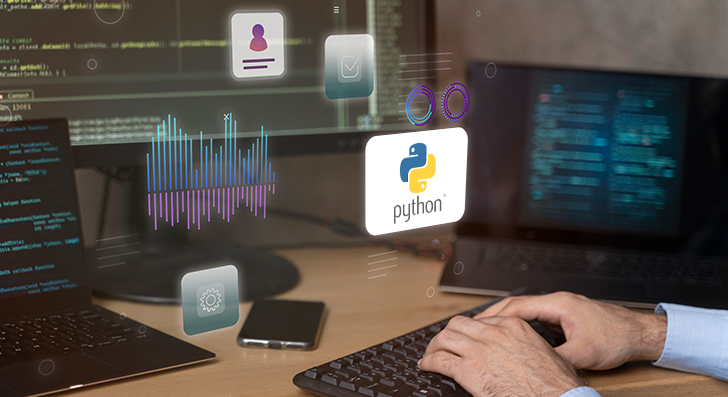Enterprise applications play an instrumental role in business operations by catering to the unique needs of an organization, ranging from human resources planning to customer relationship management. These large-scale applications stand as the backbone of organizational functionality, serving as the driving force behind increased productivity, improved efficiency, and streamlined business processes. This may be the reason behind the surging demand for enterprise application development. In fact, the global market size for enterprise applications is estimated to reach 480.75 billion USD by 2032.

Given the critical role these applications play in the dynamic business landscape, the journey of enterprise application development is not without its intricacies and challenges. Fortunately, Python, a popular general-purpose programming language has transcended its traditional domains to emerge as a game-changer in the realm of enterprise app development. Let’s dive deep to discover how Python helps decision-makers navigate through the maze of challenges that come along the way during enterprise app development.
Challenges in Enterprise App Development and The Role of Python as a Panacea
Enterprise application development presents a slew of challenges ranging from interoperability and scalability to security, legacy system integration, rapid application development, and more. Let’s take a sneak peek at some common challenges and how Python can be the ultimate solution.
1. Scalability Hurdles With Mounting Workloads
Given the dynamic nature of business growth, scalability is a critical consideration when it comes to developing enterprise applications. As organizations expand, their enterprise applications must scale to handle increased workloads, user interactions, and data volumes without compromising on performance. Achieving scalability involves anticipating future demands and architecting applications that can seamlessly accommodate increased workloads. Challenges arise when enterprise applications are not designed with scalability in mind, which in turn, leads to increased downtime, infrastructure costs, and performance issues.
Python when coupled with web frameworks like Django and Flask provides a scalable foundation for developing enterprise applications. These frameworks offer built-in support for load balancing, ensuring that enterprise applications can efficiently scale horizontally. Furthermore, the dynamic ecosystem of Python facilitates the integration of scalable technologies like containerization and cloud services. Lastly, the flexibility of Python allows programmers to leverage asynchronous programming and optimize code performance, enabling enterprise applications to handle growing demands effortlessly while maintaining optimal performance.
2. Time Constraints in the Face of Competition
Another common challenge that enterprises face during enterprise app development is the pressure to deliver applications in a quick turnaround time. In fact, many organizations grapple with the need for rapid development cycles to capitalize on emerging opportunities, respond to competitive pressures, and meet changing market demands. This challenge is further compounded by the complexity of enterprise-grade applications that involve intricate business logic, compliance requirements, and integrations.
Python’s simplicity allows developers to write clean and readable code, promoting faster collaboration and reducing the time required for coding and debugging applications. Its expressive and concise syntax accelerates application development timelines without compromising on the code quality. Furthermore, the extensive library support and rich ecosystem of frameworks provided by Python enable developers to build enterprise applications rapidly. Lastly, the agile nature of Python perfectly aligns with rapid development methodologies, enabling decision-makers to respond to changing business requirements.
Orchestrating Brilliance in App Development With Python
3. Security Concerns Amid Data Breaches and Cyber Attacks
Security is a perpetual challenge when it comes to protecting critical business data and ensuring compliance with regulatory requirements, as the stakes are always high. Challenges often arise when security is treated as an afterthought rather than an integral part of the application development process. Furthermore, the dynamic threat landscape characterized by sophisticated cyber attacks makes security a key concern in enterprise app development.
Python with its strong emphasis on secure coding practices provides a robust foundation for building secure enterprise-grade applications. Its standard library includes modules for hash functions, secure sockets, and cryptography enhances data protection. Furthermore, the frameworks of this programming language come with built-in security features, providing protection against common web vulnerabilities like cross-site scripting and SQL injection. Additionally, the support of Python for third-party libraries and security tools incorporates comprehensive security measures, which in turn, safeguards enterprise applications against evolving threats and cyber attacks. Lastly, the large and active community of Python ensures quick identification and resolution of security vulnerabilities.
4. Compatibility Issues With Existing Systems
Legacy systems are critical to ongoing operations, however, they may pose integration challenges with enterprise applications due to rigid architectures, outdated technologies, and lack of documentation. The process of integrating legacy systems with enterprise applications needs to be done strategically as poorly executed integrations can not only disrupt operations but also lead to data inconsistencies. The good news is that Python supports various integration mechanisms including middleware, database connectors, and direct API calls which in turn, makes it a coveted choice for overcoming integration challenges with legacy systems. Furthermore, Python’s extensive documentation and community support play an indispensable role in navigating legacy codebases, ensuring a hassle-free integration process that not only incorporates modern functionalities but also preserves the value of existing systems.
Harness the Strategic Advantage of Enterprise App Development
Real-world Examples of Python for Enterprise Application Development
Python has become a coveted choice for developing enterprise applications owing to its readability, versatility, and rich ecosystem of libraries and frameworks. Listed below are some successful examples of businesses utilizing Python for enterprise application development.
1. Instagram
Instagram is one of the popular social media platforms relying heavily on Python for its backend infrastructure. Django, a Python-based web framework, is a crucial component that allows the application to handle millions of users’ interactions and manage data while ensuring a smooth user experience. Furthermore, Django’s rapid development capabilities and Python’s readability contributed to the scalability and feature-rich functionality of the application.
2. Spotify
Spotify, a popular music streaming application employs Python in several backend-related tasks including recommendation algorithms, data analysis, and managing the extensive music library. Python’s rapid development capabilities provide the agility needed for continuous innovation in the dynamic music industry.
3. Reddit
Reddit relies heavily on Python for its backend development. Python’s readability, simplicity, and ability to handle a large number of requests contributed to Reddit’s success as a popular social news aggregation platform.
Summing Up
Python is not merely a programming language, it’s a formidable catalyst propelling organizations into a future where enterprise applications aren’t just tools but contributors to growth, innovation, and success. The power of Python lies not in its clear syntax or rich ecosystem of libraries and frameworks but it’s in the efficiency it unlocks, the door it opens, and the revolution it sparks within the digital landscape. If you are also planning to embrace this transformative force empowering businesses to transcend barriers, it’s wise to partner with a reliable Python application development company that transforms challenges into opportunities and ideas into reality.





